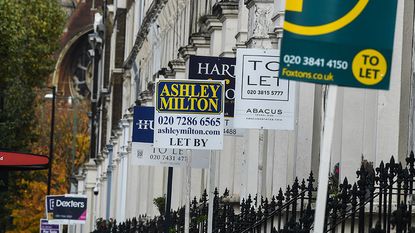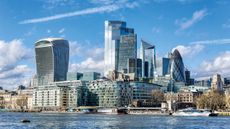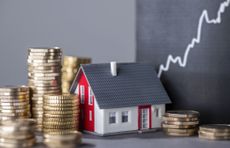Which is best – buy-to-let or shares?
Buy-to-let property used to be a great investment, but it’s no longer a sure-fire way to make money.


There was a time when becoming a buy-to-let landlord was a popular way to invest money for the future.
But in recent years, buy-to-let’s popularity has declined as the government imposed higher costs and tighter restrictions on landlords.
In 2016, the government added a 3% surcharge to stamp duty for properties other than your main residence. And changes to tax rules mean higher-rate taxpayers can now only claim 20% tax relief on their mortgage interest payments, rather than 40% or 45% (you can get around this by using a limited company although that comes with its own set of complications).
Subscribe to MoneyWeek
Subscribe to MoneyWeek today and get your first six magazine issues absolutely FREE

Sign up to Money Morning
Don't miss the latest investment and personal finances news, market analysis, plus money-saving tips with our free twice-daily newsletter
Don't miss the latest investment and personal finances news, market analysis, plus money-saving tips with our free twice-daily newsletter
On top of these changes, borrowers now have to contend with record-high mortgage rates as the Bank of England hikes up interest rates to combat rising inflation.
According to Moneyfacts the average interest rate on fixed buy-to-let mortgages now stands at 5.4%. On some products, the rate is closer to 7%!
These rates will probably only increase after the Bank of England meets on 3 November to discuss where interest rates will go next.
What is the return on a buy-to-let property?
A good property rental yield in the UK is considered to be between 6% and 8%, says NatWest. But that’s a crude figure based purely on the purchase price, ignoring stamp duty and any legal fees.
Add in insurance, repairs and maintenance, fees to letting agents and voids (times when the property is empty and not producing any rental income) and your expected yield starts to fall.
In reality, many landlords find their rental income covers their expenses but produces very little on top of that.
Of course, there is capital growth to consider, too – the old adage that you “can’t go wrong with bricks and mortar”.
The average UK house price has risen from £170,000 in June 2012 to £296,000 in August 2020, according to the Office for National Statistics – an average annual rise of 13.6%.
But when you come to cash in that gain by selling the buy-to-let property, you will have to pay capital gains tax as well as the other charges that come with buying and selling houses.
Energy performance certificates (EPC) are mandatory for anyone selling a home and you must have ordered one before your property is placed on the market. These range from £35 to £150 plus VAT; the typical price according to The Advisory, which offers house selling advice, is £75 plus VAT, so let’s place the cost of your EPC at £90.
Estate agent fees range between 0.75% and 2.25% plus VAT of your property’s final sale price. The majority of traditional high street estate agents, which are used by around 95% of all house sellers, won’t charge you if they don’t sell the house but the average fee sits between 1.42% including VAT. On the sale of a £296,000 property (the current average price of a house), this would amount to £4,203.
Conveyancing solicitor fees range from £550 to £1,000 so for an estimate’s sake, lets place the average at £750.
If you’re selling while you’re still paying off your mortgage you’ll also have to pay a mortgage exit fee (costs range between £50 and £300) and an early repayment charge, which is between 1% and 5% of your loan amount.
You also have to factor in removal costs, which will vary depending on the number of things you have to transport and whether you do the packing yourself, the distance you’re moving and your home’s accessibility. If you want to reduce removal costs you could hire a van and do it yourself. Also consider the cost of things like cleaning, repairs, and redecorating.
If you’re selling a property that’s not your primary residence you’ll have to pay capital gains tax. This will be calculated based on how much your property has increased in value throughout the time you’ve owned it. You can deduct the cost of any improvements plus the costs of buying and selling the property.
So based on a £296,000 property you’d be paying £90 for your EPC, £4,203 in estate agent fees, and £750 in conveyancing fees. This takes the average cost of selling a house to £5,043 excluding any mortgage charges, removal fees and decorating charges.
If your property has increased from £170,000 in June 2012 to £296,000 in August 2022 you’ll have made a gain of £120,957.
For someone earning £30,000 a year with a £12,300 capital gains annual exempt amount, the tax due on the sale would be £28,397.
So, when all is said and done, the after-tax profit would be £92,560. That’s an annual return of just 4.4%.
This is only a ballpark number. It does not include any costs incurred when buying the property in the first place, and any cash spent keeping the property in a livable condition.
These extra costs will reduce the capital gains tax due at the time of the sale, but they’ll also eat away at overall profits.
And price growth gains are in no way guaranteed.
Interest rates are on the rise, and that’s going to have an effect on house prices – and your returns.
What about stock market returns?
Compare all that to putting that same £296,000 into the stock market.
Investing in the S&P 500 would have returned 10.7% on average since the index’s inception, and 14.7% in the last ten years, says Business Insider (this is on a dollar basis returns in sterling may have been higher). The average ten-year return from investing in the UK’s FTSE 100 index is 8.4%, says IG. Since the index’s inception, total returns have averaged 7.75%.
Capital gains tax applies to investments too, of course, unless you have put them in a tax-free wrapper such as an Isa or Sipp.
There is also the amount of work to consider. Investing can be as much work as you make it. Picking stocks is tough and involves a lot of research, but putting your money in an FTSE 100 tracker involves about as little effort as it is possible to make.
Being a buy-to-let landlord can be very labour-intensive, even if you farm out much of the day-to-day business to a letting agent. A landlord has a host of legal responsibilities from gas and electrical safety certificates, and even regulations covering what furniture you can use.
And if you don’t vet your tenant properly and it turns out that they do not have the “right to rent'' in the UK, you could face five years in prison or an unlimited fine.
Based on monetary returns alone, stocks have been the better buy.
If an investor had placed £170,000 in the S&P 500 ten years ago rather than buying a rental property, the investment would be worth a staggering £732,796 today. That’s before tax and, to keep things simple, without factoring in foreign exchange rates.
The same investment in the FTSE 100 would be worth £392,632.
But again, this isn’t always going to be the case. If you have a property that skyrockets in value and you sell it at the right time you might find you’ve made a far more significant gain.
Equally, if you decide to sell equities at the wrong time you could suffer a painful loss.
Regardless, things look very uncertain for the property market for the foreseeable future.
Interest rates will continue to rise, therefore so will mortgage rates. This will make it even harder for buy-to-let landlords.
The stock market also has its ups and downs but based on the maths, even despite the risk, equities have been the better buy over the past decade on average.
Nic studied for a BA in journalism at Cardiff University, and has an MA in magazine journalism from City University. She joined MoneyWeek in 2019.
-
-
 Investment trust discounts hit 2008 levels. Here’s how to profit
Investment trust discounts hit 2008 levels. Here’s how to profitInvestment trust discounts have risen to levels not seen since 2008, here are three trusts looking to buy to profit.
By Rupert Hargreaves Published
-
 A luxury stock to buy at a high street price
A luxury stock to buy at a high street priceInvestors wrongly consider Watches of Switzerland a high-street outlet.
By Dr Matthew Partridge Published
-
 Investing in wine: how Cru Wine is reaching new audiences
Investing in wine: how Cru Wine is reaching new audiencesTips Gregory Swartberg, founder of fine wine specialist Cru Wine, talks to Chris Carter about how to start a wine collection
By Chris Carter Published
-
 Small companies with big potential
Small companies with big potentialMichael Taylor of Shifting Shares reviews his 2023 picks and highlights more promising minnows.
By Michael Taylor Published
-
 The MoneyWeek portfolio of investment trusts – July 2023 update
The MoneyWeek portfolio of investment trusts – July 2023 updateTips A decade ago we set up the MoneyWeek portfolio of investment trusts. They remain a compelling long-term bet says Rupert Hargreaves
By Rupert Hargreaves Published
-
 Women lead the way with ethical investments
Women lead the way with ethical investmentsDemand for more ethical investments has soared – and women are more likely to opt for them. Annabelle Williams, personal finance specialist at Nutmeg, takes a look at why.
By Annabelle Williams Published
-
 BoE: Mortgage payments to rise by £220 a month for households
BoE: Mortgage payments to rise by £220 a month for householdsMillions of households can expect a mortgage spike of around £200 a month - and some may even reach a extra £1,000 a month, the Bank of England warns
By Marc Shoffman Published
-
 What happened to Thames Water?
What happened to Thames Water?Thames Water, the UK’s biggest water company could go under due to mismanagement and debt. We look into how the company got itself into this position, and what investors should expect.
By Simon Wilson Last updated
-
 Where to invest in the metals that will engineer the energy transition
Where to invest in the metals that will engineer the energy transitionA professional investor tells us where he’d put his money. This week: John Ciampaglia, manager of the Sprott Energy Transition Materials UCITS ETF.
By Nicole García Mérida Published
-
 How investors can profit from high food prices
How investors can profit from high food pricesThe latest furore over grocery prices will die down, says David Stevenson. But the long-term outlook for soft commodities remains bullish. These are the stocks investors can buy to profit from high food prices.
By David J Stevenson Published









